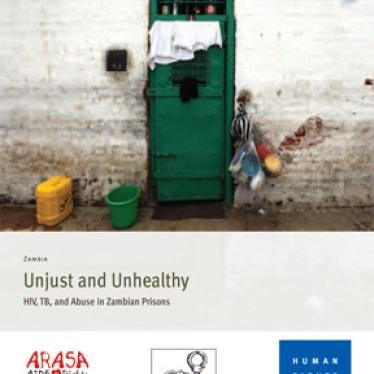International AIDS Conferences — like the one planned for next week in Vienna — can be strange affairs. On the one hand, there is a reason to celebrate: Scaled up treatment campaigns have prolonged millions of lives; HIV testing and education are reaching many more. Yet, on the other hand, there is the reality that more than 33 million people are living with HIV worldwide.
Despite efforts to expand treatment, nearly three million more become infected each year. In Zambia alone, over one million people are living with HIV.
Since 2005, the government of Zambia has made an impressive commitment to providing HIV treatment free to all who need it. But five years later and decades into the HIV crisis, prisoners — a vulnerable group in the spread of HIV — remain neglected in HIV testing and treatment efforts. And since prisoners almost always return to the community, it isn’t just a problem for prisoners but for all Zambians.
When last measured, HIV prevalence in Zambian prisons was a staggering 27 percent, almost double the rate in the general population. In April, Human Rights Watch, the AIDS and Rights Alliance for Southern Africa, and the Prisons Care and Counselling Association released a report detailing prison health conditions in Zambia. We interviewed almost 250 prisoners, and found that there has been some progress in recent years in testing and treatment. Overall, just over half of the prisoners we spoke with had been tested for HIV. But that number masks the fact that testing is much lower at rural prisons, and among female, juvenile, pre-trial, and immigration prisoners.
Numerous other problems complicate the prevention and treatment of HIV in Zambian prisons. Although there is sexual activity between male inmates, condoms are not available. Food is inadequate, and prisoners with HIV have difficulty taking medications because of their hunger. Adequate treatment and regular monitoring are impossible in the absence of prison-based health services, and a lack of transport or fuel, or the decisions of non-medical officers, may keep HIV-positive inmates from getting treatment in community-based hospitals or clinics for weeks or months after they fall ill.
Of particular concern is the large number of pre-trial detainees in Zambian prisons. HIV infection should never be part of anyone’s prison sentence. But these individuals — more than one-third of all inmates — have not been found guilty of any crime, are being held with convicted prisoners, exposed to infectious disease, and are less likely than convicted prisoners to have access to HIV testing or to health care. Holding individuals for long periods before trial is a major reason why Zambian prisons are severely overcrowded. It also makes it much easier for tuberculosis — the main cause of death for prisoners — to rapidly spread.
Only three percent of the prisoners we spoke with in Zambia had seen a judge within 24 hours of arrest — a requirement under the law. We met a convicted prisoner who had waited for 10 years for a trial, and inmates who had waited even longer for an appeal. One juvenile prisoner had been ordered released by a judge a year and a half earlier, but had yet to be let go.
Arbitrary arrests—police and drug enforcement officials are known to lock up whole families when their primary targets cannot be found—lack of bail, and lack of representation all are also major contributing factors in the extended pre-trial detention crowding the country’s prisons.
With the help of CHRESO Ministries, HIV testing and treatment is being offered in six of Zambia’s 86 prisons. But prison-based testing and treatment services desperately need to be scaled up to reach all prisoners in every Zambian prison.
But that will not be enough. The Zambian government must also provide funding to eliminate overcrowding, expedite trials and appeals, and extend non-custodial alternatives. These steps are requirements under international law, but will also cost the Zambian government less than maintaining overcrowded prisons and failing to address the HIV and tuberculosis epidemics. “The long stay of prisoners without trial is unbearable,” Chisala, a prisoner at Mukobeko Maximum Security Prison, told us. It is also unjust and dangerously unhealthy.






